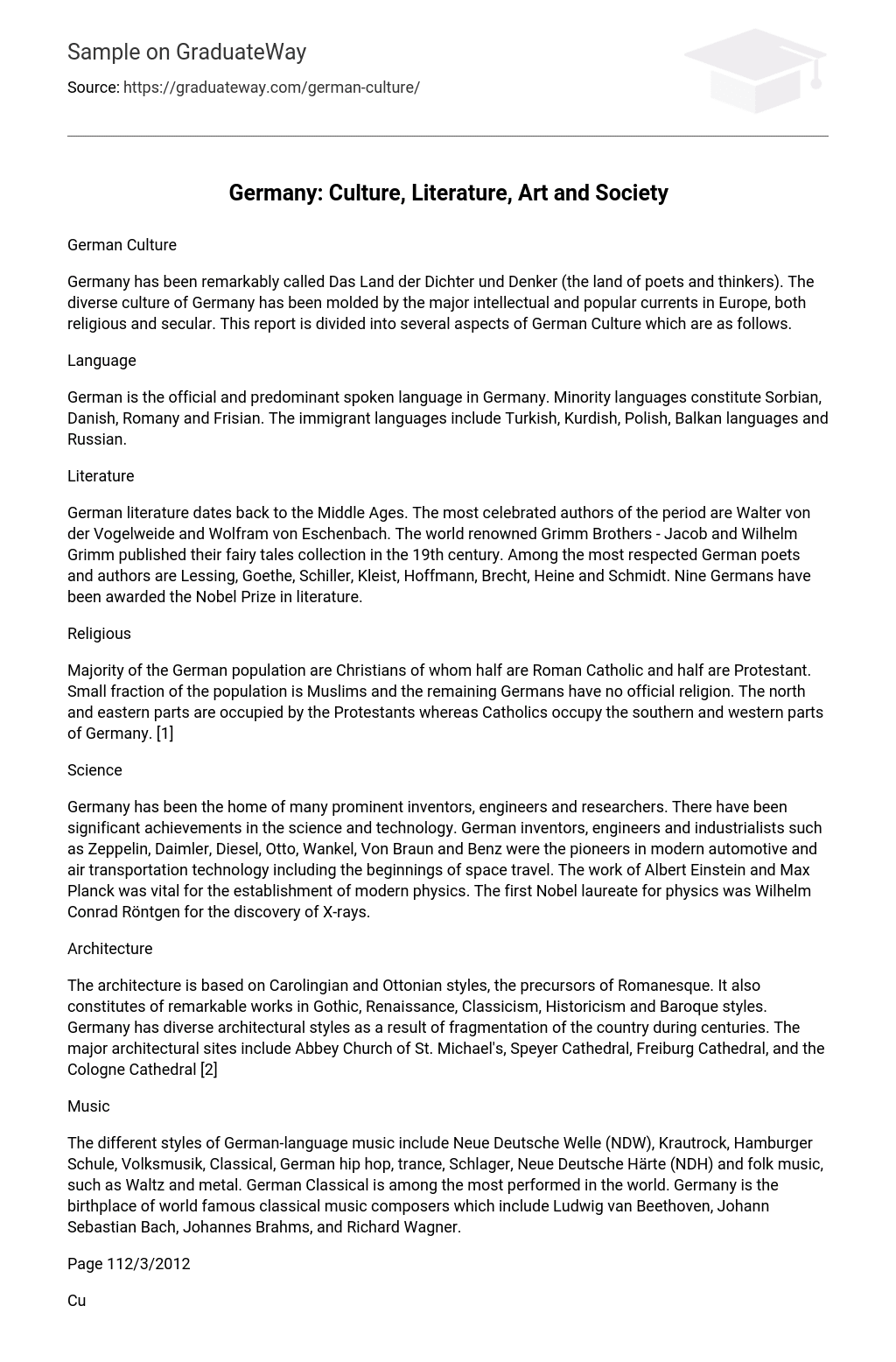German Culture
Germany has earned the notable nickname “Das Land der Dichter und Denker” (the land of poets and thinkers). The rich cultural heritage of Germany has been influenced by various intellectual and popular movements in Europe, encompassing religious and secular influences. This report is organized into different aspects of German Culture, as listed below.
Language
German is the primary spoken language in Germany and is the official language of the country. Additionally, Germany has minority languages such as Sorbian, Danish, Romany, and Frisian. Immigrant languages in Germany include Turkish, Kurdish, Polish, Balkan languages, and Russian.
Literature
Germany has a rich literary tradition that spans from the Middle Ages to the present day. Some of the most notable authors from the Middle Ages include Walter von der Vogelweide and Wolfram von Eschenbach. In the 19th century, the Grimm Brothers, Jacob and Wilhelm Grimm, gained worldwide recognition for their collection of fairy tales. Since then, Germany has produced many respected poets and authors such as Lessing, Goethe, Schiller, Kleist, Hoffmann, Brecht, Heine, and Schmidt. Additionally, nine Germans have been honored with the Nobel Prize in literature.
Religious
The majority of Germany’s population consists of Christians, with an equal split between Roman Catholics and Protestants. A small portion of the population identifies as Muslims, while the rest of the Germans do not have an official religion. Protestants are primarily located in the north and eastern parts of Germany, while Catholics are concentrated in the southern and western regions.
Science
Germany has been the birthplace of numerous distinguished inventors, engineers, and researchers, with remarkable advancements in science and technology. Prominent German figures such as Zeppelin, Daimler, Diesel, Otto, Wankel, Von Braun, and Benz played pivotal roles in revolutionizing automotive and air transportation technology, including the initiation of space exploration. The contributions of Albert Einstein and Max Planck were fundamental in establishing contemporary physics. Notably, Wilhelm Conrad Röntgen became the inaugural recipient of the Nobel Prize in Physics for his groundbreaking discovery of X-rays.
Architecture
The architecture in Germany is a combination of Carolingian and Ottonian styles, which were the forerunners of Romanesque. Additionally, it features impressive works in Gothic, Renaissance, Classicism, Historicism, and Baroque styles. This diversity is due to the historical fragmentation of the country over the centuries. Some notable architectural sites in Germany include the Abbey Church of St. Michael’s, Speyer Cathedral, Freiburg Cathedral, and the Cologne Cathedral.
Music
The various genres of German music incorporate Neue Deutsche Welle (NDW), Krautrock, Hamburger Schule, Volksmusik, Classical, German hip hop, trance, Schlager, Neue Deutsche Härte (NDH), and folk music like Waltz and metal. German Classical music is widely performed globally. Germany is renowned for being the homeland of celebrated classical music composers such as Ludwig van Beethoven, Johann Sebastian Bach, Johannes Brahms, and Richard Wagner.
Cuisine
German cuisine has regional variations and includes a variety of meats, particularly sausage, as well as sweet desserts and Stollen fruit cake. The cuisine is divided into three categories: Bavarian, Thuringian, and Lower Saxon. The main types of meat consumed are pork, beef, and poultry, with pork being the most popular. Rye bread is a famous German specialty. Popular beverages include beer, German wine, carbonated mineral water, and schorle.
Art
In the field of visual art, Germany has a rich history from early figurative art to contemporary works. Artists such as Albrecht Altdorfer, Lucas Cranach the Elder, Matthias Grünewald, Hans Holbein, and Albrecht Dürer made significant contributions during the Renaissance. Caspar David Friedrich was prominent during the Romanticism period. The Brücke and the Blaue Reiter movements were notable expressions of Expressionism. Max Ernst was a prominent figure in Surrealism. Joseph Beuys and Wolf Vostell were influential in Conceptualism. Georg Baselitz made a mark in Neo-expressionism.
Cinema
German cinema has been a significant force in the film industry since the 19th century. It has made major technical and artistic contributions, starting with the Skladanowsky brothers who conducted the first public display of their self-invented film projector in 1895. One of the most notable films from this era is Fritz Lang’s silent movie Metropolis, which is considered the pioneer of modern science fiction movies. More recently, German films have achieved recognition by winning Academy Awards. Every year since 1951, the Berlin film festival, also known as Berlinale, has been held to showcase up to 400 films across various sections, providing a comprehensive exhibition of the cinematic world.
Sports
Germany dominates in various sports disciplines. Tennis, track and field, cycling, and swimming are just a few areas where Germany excels globally. Football holds the esteemed title of national sport, while ice hockey, volleyball, handball, and basketball are also widely popular among spectators. Additionally, Germany boasts a strong presence in motorsports, producing renowned Formula 1 champions like Michael Schumacher and Sebastian Vettel. The country is also home to numerous ski resorts that attract international skiers. Throughout history, German athletes have consistently achieved remarkable success in the Olympic Games.
Philosophy
German philosophers have had a major impact on western philosophy since the middle ages. Leibniz and Kant were prominent figures in the 17th century, shaping world philosophy. Karl Marx and Friedrich Engels developed the communist theory in the 19th century. Adorno, Habermas, Luhmann, Simmel, and Webern were influential German intellectuals in the field of sociology. Germany has now become a significant country for the advancement of contemporary analytic philosophy in Europe.
Society
Germany is a modern society that has been shaped by a variety of lifestyles and regional identities. The majority of its population is well-educated and enjoys a high standard of living. As globalization has progressed, Germany has embraced its role as a modern society that welcomes immigrants from diverse ethnic backgrounds. The country has made significant efforts to integrate these migrants into the fabric of society.
Reference
- The German Way Of Life ,http://www.east-buc.k12.ia.us/02_03/cul/germany/germany.htm
- Countries and Their Cultures- Germanyhttp://www.everyculture.com/Ge-It/Germany.html
- Culture of Germany http://www.mapsofworld.com/germany/about/culture.html
- German society – modern, pluralist and open-minded http://www.tatsachen-ueber-deutschland.de/en/society/main-content-08/german-society-modern-pluralist-and-open-minded.html





